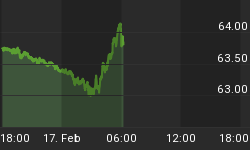Many traders, given all the statistics, trends, and patterns at their disposal, have been reluctant to buy stocks for a while now. Momentum traders would contest, however, that by not buying, you would have missed out on some pretty decent gains for stocks over the past few months. It's true- even your most reliable indicators often will tell you when to enter a trade, but they won't always tell you how long a market may stay in a trend. The old axiom about the market remaining irrational longer than you can remain solvent comes to mind. But that begs the question: Is the market irrational here?
One of several forecasting tools available to economists (and investors) includes the Baltic Dry Index, or BDI. With one of our newsletters, CycleShares, we try to go where the data tells us as often as possible. The market occasionally does not correlate to the tools available to us, but those are the times to be cautious in our opinion. Our 2009 performance is respectable for sure (+20% YTD), but anxious investors with short time horizons get antsy when no bullish (or bearish) stock recommendations are forthcoming. And so it currently goes with CycleShares and the BDI. This index may be one of the best macro economic tools for assessing economic activity and the stock market. It generally leads the market, as seen in the early Spring of 2009, prior to the bottom in March. What concerns us now is the obvious divergence we've seen since June, with the BDI falling rapidly while stocks climb.

Is this 100% reliable - can you simply time the market based on its movement? Hell no! Just look at 2005, when it also fell off a cliff, but the market continued higher, scorching bears in its wake. Ultimately the BDI turned up as well, so if you had followed it, you would have gained more, yet missed out on a percentage of the market's gains. Using this tool is just like any other-it must be used with confirming indicators to form a bigger picture- one that may cause you to miss some easy gains, but could also keep you out of harm's way. Under the current circumstances, this divergence signals caution, including taking bullish positions of any duration. If it makes a higher high and stocks are still climbing, you could rethink your position assuming you use some other measures that confirm a bullish view.
Today we're dealing with a Federal Reserve and Congress almost begging the public to enter into debt via accommodative money policies and incentive-based stimuli. Perhaps the BDI will turn up again as this blistering run-up continues, but unlike the stock market, the BDI is more of a reality gauge that often conflicts with sentiment. Our leaders may coerce "sheople" into debt, but it's the populace that determines whether they can afford to buy more products or not. Sentiment is a two-way street, but for the near term, irrationality has won out. Now the question remains if it will continue.
















